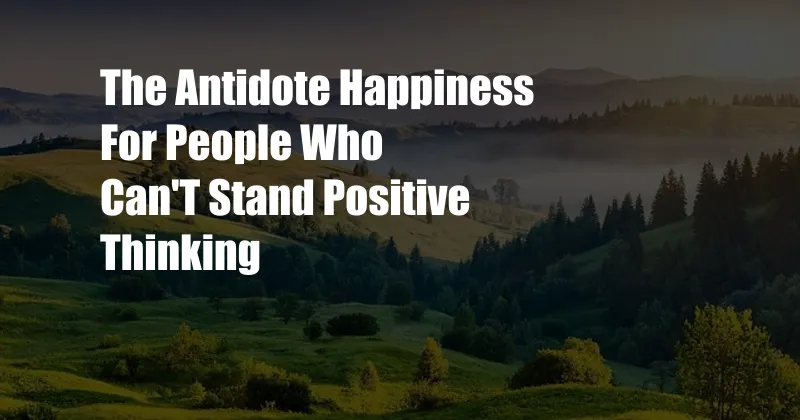
The Antidote to Happiness for Those Who Can’t Stand Positive Thinking
The relentless pursuit of happiness can feel like an unattainable fairy tale, leaving many feeling like failures. Constant positive thinking can become an oppressive burden, especially for those who find themselves struggling with life’s challenges. If positive thinking feels like an elusive fantasy, it’s time to explore the antidote to happiness—a path that embraces the acceptance of reality.
Instead of striving for an unattainable state of perpetual bliss, focusing on finding meaning and purpose amidst the complexities of life may offer a more fulfilling and sustainable path.
The Illusion of Positive Thinking
The notion of positive thinking often fails to acknowledge the human capacity for experiencing the full spectrum of emotions. By suppressing or denying negative emotions, we rob ourselves of the opportunity to learn from them and develop resilience. Moreover, it can lead to a sense of inauthenticity and an inability to connect with others who may be struggling.
Positive thinking can also promote perfectionism and self-criticism, as it creates a false expectation of living an eternally optimistic life. This can be especially harmful to those already struggling with self-worth issues or facing significant challenges.
Embracing Reality
The antidote to happiness is not about wallowing in misery but about accepting reality with its complexities, both positive and negative. This balanced perspective allows us to acknowledge our challenges without becoming overwhelmed by them. It also empowers us to appreciate the moments of joy and fulfillment without feeling guilty or invalidating our struggles.
Accepting reality means recognizing that life is not always fair, and there will be times of pain and disappointment. However, it also means acknowledging that there is beauty, love, and potential for growth amidst those challenges. By embracing a realistic worldview, we cultivate a mindset that is both grounded and hopeful.
Finding Meaning and Purpose
Happiness is not the result of external circumstances but rather a byproduct of living a meaningful and purpose-driven life. Meaning can be found in our relationships, work, hobbies, and the pursuit of personal growth. By focusing on activities that bring us joy and fulfillment, we create a sense of purpose that transcends temporary setbacks.
Purpose can also be discovered through service to others. Helping those in need not only benefits them but also provides us with a sense of belonging and a deeper appreciation for the gifts in our own lives.
Expert Advice and Tips
**Embrace Imperfection:** Recognize that you and your life are flawed, and that’s perfectly okay. The pursuit of perfection is an endless cycle that can lead to frustration and unhappiness.
**Practice Self-Compassion:** Treat yourself with the same kindness and understanding you would offer to a loved one. Remember that everyone goes through challenging times, and it’s okay to experience negative emotions.
**Cultivate Gratitude:** Take time each day to appreciate the good things in your life, no matter how small. Gratitude shifts your focus from what you lack to what you have, fostering a sense of contentment.
**Engage in Activities that Bring Joy:** Make time for activities that bring you happiness, whether it’s reading, painting, or spending time in nature. These activities can provide a sense of escape and recharge your batteries.
FAQ
Q: Is it wrong to feel negative emotions?
A: No, negative emotions are a normal and healthy part of human experience. Suppressing or denying them can lead to emotional imbalances and hinder personal growth.
Q: How can I find meaning in my life?
A: Meaning can be found in many different ways, such as through relationships, work, hobbies, and personal growth. Explore various activities and experiences to discover what brings you joy and fulfillment.
Q: Is true happiness possible?
A: True happiness is not a constant state but rather a journey characterized by a balance of positive and negative experiences. By accepting reality and finding meaning and purpose, we can cultivate a greater sense of contentment and well-being.
Conclusion
The antidote to happiness is not the absence of negative emotions but the acceptance of reality and the pursuit of a meaningful and purpose-driven life. By embracing our imperfections, practicing self-compassion, cultivating gratitude, and engaging in activities that bring us joy, we can find a path to happiness that is sustainable, fulfilling, and grounded in the complexities of human experience.
Are you ready to embrace the antidote to happiness and discover a more balanced and meaningful journey?